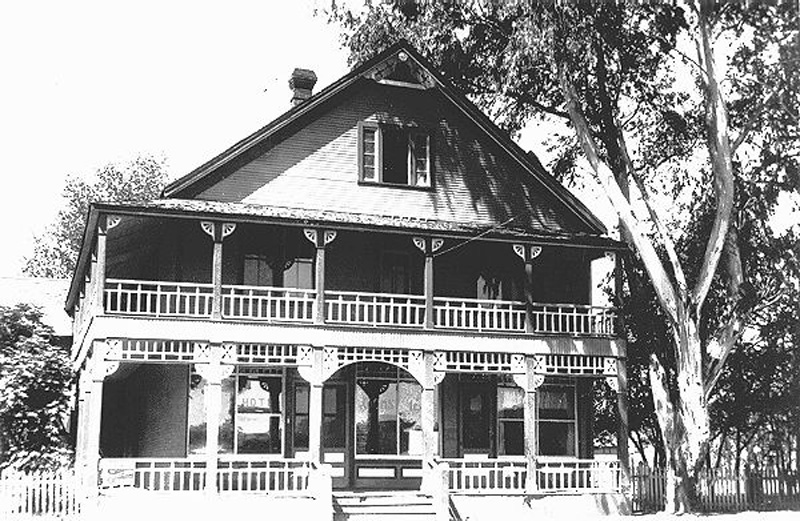|
|
HISTORY OF THE SANTA CLARITA VALLEY BY JERRY REYNOLDS
[NEXT] [PREVIOUS] [CONTENTS] [SEARCH]45. Father of Acton
The opening of the first Cedar Mining District in 1870 brought in a lot of miners and prospectors who, if nothing else, worked up a powerful thirst.
Recognizing an opportunity, John F. Duehren decided that a lot more money could be had from selling refreshments than from wielding a pick and shovel. In a grove of trees he built a small, board-and-batten establishment which he called the '49er Saloon. It was an instant success.
Six years later, crews of the Southern Pacific Railroad put down tracks just south of the '49er, which certainly increased Duehren's business. By October 1876, a Southern Pacific depot was established, bearing the name of Acton. It was supposedly named by Henry Mayo Newhall for a small town near his birthplace in Massachusetts.
Duehren built a large, two-story stone house for his family. It still stands. He was the only resident until Oct. 11, 1887, when a Southern Pacific passenger train ground to a halt at the tiny station. Out stepped a dynamic young man from Kansas by the name of Rudolph Eugene Nickel.
Local tradition has it that Nickel was employed by Henry T. Gage to oversee his mining interests. If so, he immediately started moonlighting, for within a month Nickel had a two-story structure with a mercantile store downstairs and family quarters in the rooms above.
In anyone can be considered the founder of Acton, it is R.E. Nickel. He succeeded in getting the Soledad Post Office moved into his store and on Jan. 24, 1888 became the town's first postmaster.
Two years later he built the Acton Hotel, a two-story, wood-frame Victorian building complete with gingerbread trim and balcony. Before it burned to the ground in 1945 it hosted several notable people, including a couple of presidents and a king of Spain. Lou and Herbert Hoover stayed there while visiting her parents. Theodore Roosevelt was a guest several times, enjoying the company of his ally Governor Gage and exploring Kentucky Springs.
One tale has Roosevelt waking up early in the morning one late April day in 1903. Supposedly he strolled out onto the Acton Hotel balcony where he stretched and sucked in great quantities of crisp, clean country air. As the sleep cleared from his eyes, the Rough Rider spied a huge buck grazing across the road. Dashing back into his bedroom, he grabbed a rifle and dispatched the animal with one clean shot. Everyone dined on venison for breakfast.
Children were taught at the Little White School beginning in 1881. Reverend F.W. Pattee delivered the area's first sermon in one of the school rooms on Sunday, June 17, 1888.
The board-and-batten structure was destroyed by flood within the decade. The much larger Soledad School was erected on higher ground in 1890. This new building, constructed of hand-made brick, reportedly took several years and four thousand dollars to complete. Its forty-five original pupils took their lessons from teacher Mattie Adams.
R.E. Nickel rescued the earlier schoolhouse from the pond in which it was mired and moved it next to his hotel. It eventually became the present community church.
The Santa Clarita Valley's first newspaper appeared on July 15, 1891 and crowed on the fifteenth of each month for the next twenty-four years. Named The Acton Rooster, it was founded by none other than R.E. Nickel.
With six hundred dollars in capital, Nickel established the Acton Water Works — the valley's first such agency — on Nov. 2 of that same year.
No one knows what the town might be like today had R.E. Nickel, the "Father of Acton," not moved away in 1900 to accept an appointment as port warden for the city of San Francisco. The appointment came from his friend, Governor Henry Gage.
©1998 SANTA CLARITA VALLEY HISTORICAL SOCIETY · RIGHTS RESERVED.

The site owner makes no assertions as to ownership of any original copyrights to digitized images. However, these images are intended for Personal or Research use only. Any other kind of use, including but not limited to commercial or scholarly publication in any medium or format, public exhibition, or use online or in a web site, may be subject to additional restrictions including but not limited to the copyrights held by parties other than the site owner. USERS ARE SOLELY RESPONSIBLE for determining the existence of such rights and for obtaining any permissions and/or paying associated fees necessary for the proposed use.